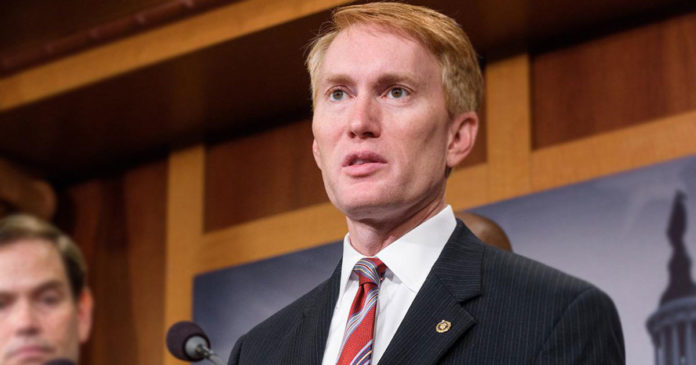
U.S. Sen. James Lankford has denounced a National Education Association (NEA) proposal to compile what he calls an “enemies list” of groups that have opposed Critical Race Theory in schools and similar left-wing agendas.
Lankford’s focus on the union comes even as the NEA’s state affiliate is touting its influence in the Oklahoma Legislature, particularly with key education chairs in the Oklahoma House of Representatives.
During the NEA’s recent Representative Assembly, union members from across the country, including Oklahoma, considered several new business items (NBIs).
One of those measures, NBI 15, called on the union to dedicate $140,625 to “compile research to create fact sheets about the largest 25 organizations that are actively working to diminish a students’ right to honesty in education, freedom of sexual and gender identity, and teacher autonomy.”
That provision would apparently lead to the NEA targeting various organizations in Oklahoma.
Groups such as the NEA have criticized states for passing laws that restrict the use of Critical Race Theory concepts in classroom settings, arguing that it outlaws honest or accurate education. Oklahoma’s law makes it illegal to teach students that “one race or sex is inherently superior to another race or sex,” that “an individual, by virtue of his or her race or sex, is inherently racist, sexist, or oppressive, whether consciously or unconsciously,” or that “an individual should be discriminated against or receive adverse treatment solely or partly because of his or her race or sex.”
Oklahoma also has a law that limits student access to multi-stall bathrooms based on sex, rather than allowing access based on self-proclaimed gender identity, and has a similar law in place for athletic competitions.
NBI 15 called on the NEA to investigate and compile data on organizations that support such laws, stating, “These fact sheets should include, but not be limited to, information about these organizations’ funding sources, their leaders within the organizations, connections to known entities that are seeking to dismantle public education, organization headquarters and chapter locations, characteristics of employed campaign strategies used by these organizations, and connections to known entities that are seeking to dismantle public education.”
The NEA’s proposal drew strong pushback from Lankford, R-Oklahoma City, and U.S. Sens. Marsha Blackburn, R-Tenn.; Cynthia Lummis, R-Wyo.; and Steve Daines, R-Mont. In a joint letter sent to NEA President Becky Pringle, the senators said they are “concerned” the NEA would want to “create an ‘enemies list’ of groups.”
“We are disturbed to know that the nation’s largest labor union, with over 3 million members working in public education, seems more concerned with advancing a ‘social justice’ agenda instead of meeting the needs of children and students who are experiencing catastrophic learning challenges,” Lankford and his colleagues wrote.
OEA Celebrates Baker, McBride, Moore, Stanley Victories
Even as Lankford criticized the NEA, the union’s state affiliate Oklahoma Education Association (OEA) is touting the election of several lawmakers who have publicly aligned with the union’s agenda enough to receive the union’s endorsement.
The OEA highlighted the primary election of state Reps. Rhonda Baker, R-Yukon; Mark McBride, R-Moore; Anthony Moore, R-Clinton; and state Sen. Brenda Stanley, R-Midwest City, with OEA president Katherine Bishop referring to those four lawmakers as “some great wins in the primary.”
Oklahoma Ethics Commission records show all four candidates’ campaigns were bankrolled, in part, by the Oklahoma Education Association through its Fund for Children and Public Education (FCPE). The union describes the FCPE as “the political action arm of the Oklahoma Education Association.”
On the OEA’s website, the union states, “When OEA FCPE and the NEA Fund for Children and Public Education recommend candidates for public office—whether it be a local school board race or the election of the United States President—candidates are measured by their commitment” to various union causes, including “opposition to vouchers” that allow families to choose from multiple schools.
Parental support for school choice has increased in Oklahoma and nationally, particularly in situations where families object to the inclusion of Critical Race Theory and similar left-wing agendas in the classroom.
Baker and McBride chair the House Common Education Committee and the House Appropriations and Budget Subcommittee on Education, respectively, and both lawmakers have voiced their opposition to and/or killed bills that would expand school-choice opportunities for Oklahoma families.
The business items submitted at the 2022 NEA Representative Assembly provide a broader glimpse of the worldview and agenda embraced by lawmakers who seek the union’s endorsement and financial support.
NBI 41 called on the NEA to “take all necessary steps to defeat and overturn the ‘Don’t Say Gay’ law in Florida and other homophobic and anti-transgender laws and attacks throughout the country.”
The referenced Florida law—which does not ban use of the word “gay”—instead states, “School district personnel may not discourage or prohibit parental notification of and involvement in critical decisions affecting a student’s mental, emotional, or physical health or well-being,” unless there is reason to believe disclosure would “result in abuse, abandonment, or neglect.” The legislation also states, “Classroom instruction by school personnel or third parties on sexual orientation or gender identity may not occur in kindergarten through grade 3 or in a manner that is not age-appropriate or developmentally appropriate for students in accordance with state standards.”
NBI 82 similarly urged the NEA to “acknowledge the existence in our country of institutional homophobia and transphobia.”
NBI 29 called on the NEA to “publicly denounce current and forthcoming Anti-LGBTQ+ legislation,” including by working “with state affiliates to challenge state legislatures that adopt anti-LGBTQ+ legislation by filing amicus briefs where appropriate” and assisting “state and local affiliates in actively organizing to defeat anti-LGBTQ+ bills through lobbying efforts.”
Oklahoma’s laws on girls’ sports and bathroom access are likely among those targeted by that proposal.
Support for abortion and attacks on states that have restricted abortion, such as Oklahoma, was a recurring theme among business items submitted at the NEA Representative Assembly.
NBI 34 called on the union to “publicly stand in defense of abortion and reproductive rights and encourage members to participate in activities including rallies and demonstrations, lobbying and political campaigns, educational events, and other actions to support the right to abortion, contraception, and a person’s decision about their health.”
The accompanying rationale stated, “NEA is a social justice union that is a majority female and trans and gender non-conforming folx who will fight against these attacks on our members, students, families, and communities.”
In an article for The 74, Mike Antonucci reported that item 34 was approved by NEA delegates by a vote of 3,103 to 1,084.
NBI 62 called on the union to “use all means at our disposal to defend reproductive freedom and Roe v Wade, including working with affiliates to organize and support marches and rallies for women’s rights and support clinic defense in cities where abortion clinics are under attack by the right wing.” That proposal also called for endorsing expansion of the U.S. Supreme Court, impeachment of the U.S. Supreme Court justices who overturned the Roe decision this year, and an end to the U.S. Senate filibuster.
A wide range of left-wing causes were touted through various other NEA new business proposals at the convention.
The written rational offered for NBI 11, which dealt with school-board candidate recruiting, stated, “In the wake of right-wing attacks on diversity, inclusion, and equity reform movements at Board of Education meetings, it is imperative that queer folk and people of color have a seat at the table.”
NBI 53 called on the NEA to “create a policy task force to develop strategies for placing the intersectionality of climate justice and environmental racism at the center of all relevant conversations and business.”
NBI 63 called on the NEA to provide sample language for school employment contracts that substituted “birthing parent” for “mother” and “non-birthing parent” for “father.”
NBI 65 called on the union to “encourage members and others to wear orange every Tuesday during September and October to show support for common-sense gun safety laws.”
At least one proposal appears to have originated with an Oklahoma union member.
Among other things, NBI 68 called for the union to advocate “for courses that give time and space to learn how to navigate White supremacy culture, and address sexism, homophobia, transphobia, anti-Blackness, colorism, etc.” The contact listed for that proposal was Yesenie Cano of Oklahoma.
It takes 50 delegates to bring an item before the NEA assembly, but those 50 delegates represent about 30,000 NEA members.
Brenda Lebsack, a California teacher who has been a critic of many left-wing trends in public education, was among those in attendance at the NEA convention. In a column, Lebsack wrote that her “worst fears were confirmed” at the event.
“Public schools are no longer a safe place for families who hold traditional values or for families who believe gender (as in male/female binary) is biologically determined,” Lebsack wrote. “It was also evident that the teachers union is a lobbying arm of the Democratic Party.”








